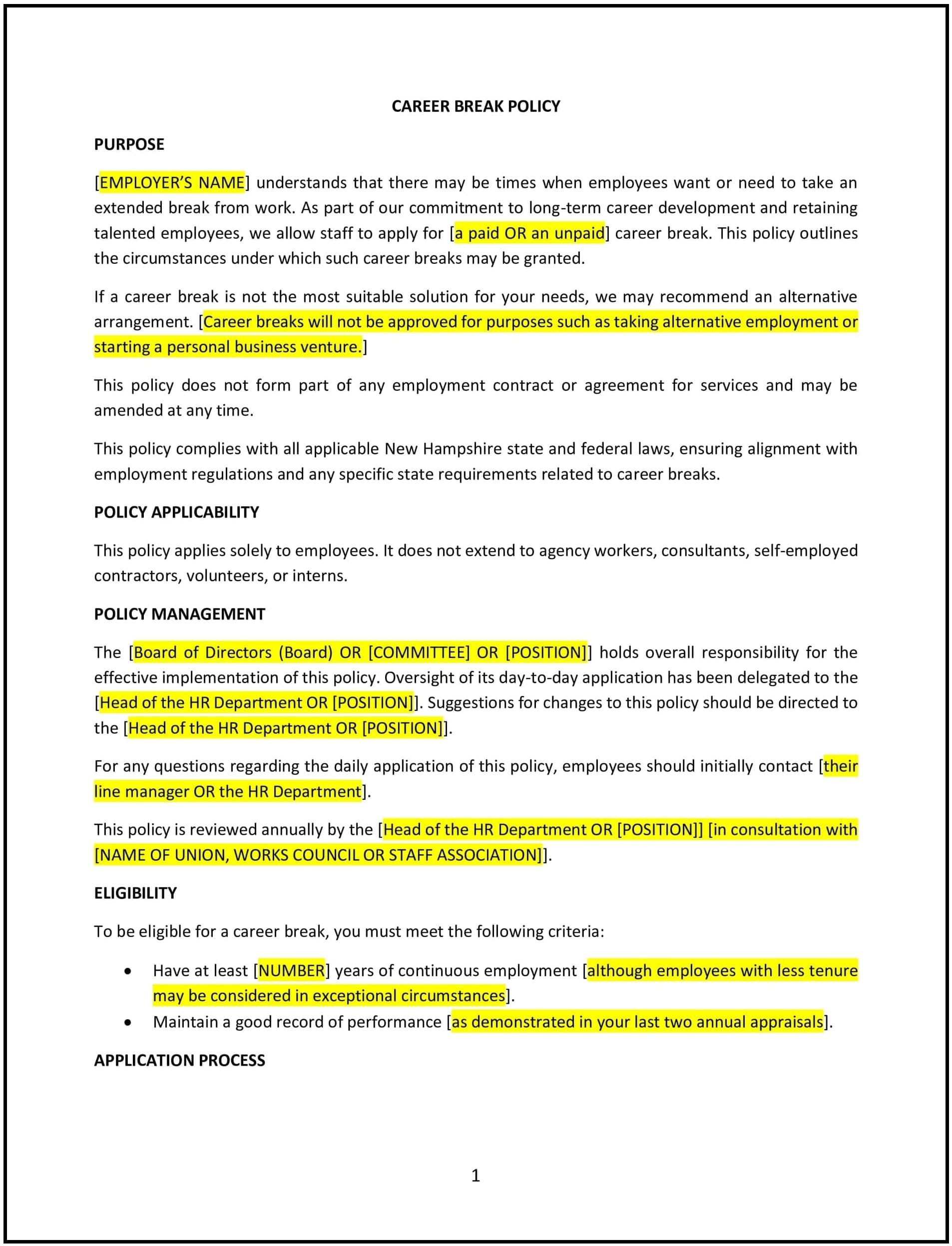Got contracts to review? While you're here for policies, let Cobrief make contract review effortless—start your free review now.

Customize this template for free
Career break policy (New Hampshire)
A career break policy helps New Hampshire businesses provide employees with the opportunity to take extended time off for personal, educational, or professional reasons. This policy outlines the process for requesting a career break, the conditions under which it can be granted, and how the break will affect employment status, benefits, and compensation.
By adopting this policy, businesses in New Hampshire can retain valuable employees by allowing them to take time away from work without jeopardizing their job or career trajectory.
How to use this career break policy (New Hampshire)
- Define eligibility: Clearly outline the criteria for employees to qualify for a career break, such as length of service, job performance, or other relevant factors.
- Set the duration of the career break: Specify the length of time employees may take off, whether it's a fixed period (e.g., 6 months, 1 year) or flexible, depending on the employee's needs and business operations.
- Address job security: Clarify that employees who take a career break will have the right to return to their position or a similar role upon the conclusion of their break, ensuring job security.
- Discuss benefits during the break: Outline whether employees will continue to receive benefits such as health insurance, retirement contributions, or paid time off during their career break.
- Specify compensation: Clearly state whether employees will receive compensation during their break and if the break will be paid, unpaid, or partially paid based on the circumstances.
- Explain the request process: Provide a clear procedure for requesting a career break, including how much notice employees need to give, any required documentation (such as for educational purposes), and the approval process.
- Set expectations for career break return: Define any expectations for employees returning to work after their career break, such as providing advance notice, completing any re-onboarding, or updating job skills.
- Review and update: Regularly review the policy to ensure it aligns with New Hampshire regulations and the business’s needs.
Benefits of using this career break policy (New Hampshire)
This policy provides several benefits for New Hampshire businesses:
- Retains valuable talent: Offers employees the opportunity to take extended leave for personal or professional growth without losing their job, helping businesses retain skilled employees.
- Supports work-life balance: Helps employees manage important life events or pursue educational opportunities, contributing to their overall well-being and job satisfaction.
- Increases employee loyalty: Demonstrating flexibility by offering career breaks can increase employee loyalty and commitment to the company, reducing turnover rates.
- Fosters professional development: Employees can use their career break to enhance their skills, pursue educational opportunities, or focus on personal growth, which can benefit the company in the long run.
- Reduces the impact of long-term absences: By having a clear and structured policy in place, businesses can better plan for employees’ absences, ensuring that work continues smoothly during their time away.
Tips for using this career break policy (New Hampshire)
- Communicate the policy clearly: Ensure that all employees are aware of the career break policy and understand how it works, including the criteria for eligibility and the steps to request a break.
- Be flexible with timing: Allow employees to take a career break at a time that suits both their needs and the company’s operational requirements, offering flexibility where possible.
- Plan for the absence: Ensure that there is a plan in place to manage the employee’s workload while they are on their break, such as temporary replacements or redistributing tasks among the team.
- Offer support for re-entry: When employees return from a career break, consider offering re-onboarding, training, or career counseling to help them reintegrate smoothly into the workplace.
- Review the policy regularly: Periodically review the policy to ensure it reflects changes in New Hampshire laws, company practices, or employee feedback.